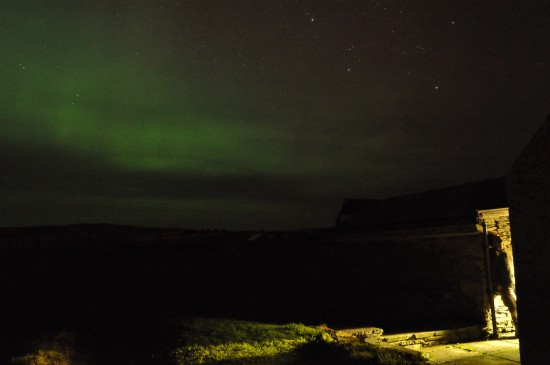
We recently opened an email from Amy Liptrot. She told us a bit about her life, now lived just beyond the edge of the mainland. She’d left London to return home to Orkney, where she’s trying to get the big city out of her system. We wanted to know more. Here, she writes about stargazing and life on a curious island.
Aurora Borealis in Orkney photograph taken by Andrew Hollinrake
Around midwinter, soon after I returned to Orkney, I began for the first time to be interested in astronomy. The long winter nights up here, combined with the lack of light pollution and the open landscape, make it an ideal location for stargazing. Under certain conditions the Andromeda galaxy can be seen by the naked eye from the islands, something only possible in places with really dark skies.
The other night, instead of going to an another meeting, I went to the first ever gathering of the Orkney Astronomical Society. I stopped drinking to do things, rather than to spend my time talking about stopping drinking, I reason. Instead, I’ve been on trips, on a freezing hillside after sunset, or sheltering from the wind behind one of the standing stones in the neolithic circle of Brodgar, looking at the canopy of night sky over the low hills and black lochs. My astronomy stance: head back, mouth open, getting dizzy.
For a couple of nights I went out alone late at night, looking for shooting stars: the Geminid meteor shower. It was too cloudy to see any but I liked being out late in the cold, my clothes over my pyjamas, acting suspiciously, stunningly sober.
With my wellies heavy on the ground, I’m building a picture of where I am: on earth, travelling, and what the moon, sun, stars are doing out there. I’m thinking about how the seasons and the years happen and how my personal anatomy affects my experience of it; developing spatial awareness on an astronomical scale, pushing my brain out; learning new and pleasing information like that there are three stages of twilight: civil, nautical and astronomical. Nautical twilight ends when the sea is no longer distinguishable from the sky and navigation via the horizon at sea becomes impossible.
I hear about how peripheral vision is best for looking into the far distance, so sometimes when you look at an object directly it can disappear. And about just why the stars appear to twinkle (it’s because of atmospheric turbulence around the earth disturbing the travelling light). I am failing to resist the temptation to treat these things as metaphors.
There are four freckles in the shape of a parallelogram on my wrist and now I can see that they resemble the constellation Gemini. I think about how the moon is getting further away from the earth and although this is only happening at about 3.78cm per year, or the same speed at which our fingernails grow, it seems terribly sad.
When first I left home for Edinburgh, my friend gave me a compass. I used to wear it round my neck at parties (I was that girl I’m afraid) and, when people asked about it, would tell them it was so I could find my way home. Wherever I was, north was always home. (I don’t have the compass anymore. How lost are you when you can’t even find your compass?)
I woke furious. I’d had a dream about being in a nightclub but feeling awkward and hating it because I wasn’t drinking. I spent a decade in clubs and gigs and late night bars and – at least for the first few years – was carried along madly: the shoulders and bass and vodka. I haven’t been out after midnight for the last eleven months and don’t know if I will again. Sometimes I feel like I’m over. I can’t imagine how to dance sober.
Geomagnetic activity was high that night and we drove out beyond the streetlights, looking for the Northern Lights. The sky was too cloudy for a good display but we watched the eerie glow behind the clouds. Later, I followed pictures of the Aurora being posted on twitter, while reading about solar cycles and coronal mass ejections and the spacecraft monitoring the sun’s potentially dangerous activity.
Despite growing up here, I’ve never taken the time to look for or watch the Northern Lights before – or Merry Dancers as they are called locally. I only remember my parents trying to get me to come out side on a winter night and wanting to stay in and watch Super Ted. There are more solar storms forecast and tonight I will go out – maybe even after midnight – again to try and see some colours for myself. I’ve swapped disco lights for celestial lights and maybe it’s not going to be so bad .